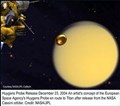Spiralock Fasteners Make Descent To Saturn's Largest Moon

Alternative thread fastening design lends fail-safe fastening performance to the Huygens probe in its descent to the surface of Titan, Saturn's largest moon, called "the biggest mystery of the solar system"

After a seven-year, two billion mile journey strapped to the side of the Cassini orbiter, the Huygens probe decelerated 12,000 mph in less than two minutes, before parachuting to the frozen surface of Titan, Saturn's largest moon, on Jan. 14th this year. Besides measuring wind, pressure, temperature, and electromagnetic fields in what scientists have called "the biggest mystery of the solar system," a microphone onboard Huygens let us hear for the first time what another world sounds like.
While your product may not travel the equivalent of 450,000 round trips between Los Angeles and New York City as the Cassini-Huygens spacecraft has in exploration of Saturn and its moons, it must function in your marketplace with minimal failure, since your brand's reputation and future sales depend on its reliability. Yet your product's underlying reliability depends on how well it is physically held together by nuts and bolts, which may loosen or fail under shock, vibration, or extreme temperature.
For fail-safe atmospheric measurement of both Saturn from the Cassini orbiter and of Titan from the Huygens probe, several hundred bolts have had to keep vacuum-tight sealed cavities with no thread loosening or stripping, despite shock, vibration, and temperature extremes including rocket launch, atmospheric re-entry, and the sub-zero chill of space.
Though some earthbound manufacturers resort to adhesives, deformed threads, nylon rings, prevailing torque nuts, and other traditional means of preventing joint loosening, these methods simply don't measure up in high load, shock, and vibration environments, especially when resistance to thermal expansion and contraction is also necessary.
"To survive the vibration and high temperatures of launch, we required the most reliable locking engagement thread," said Dan Harpold, a NASA scientist who worked on the project. "Screws had to remain tight without opportunity for re-tightening. With conventional threading, however, screws loosened up and backed out under testing."
In an effort to satisfy NASA's stringent reliability requirements on the Cassini orbiter and the European Space Agency's on the Huygens probe, an alternative thread form -- designed to address fastener loosening and stripping under high load, vibration, and temperature variation -- was used.
With no ability to tighten or replace loose or stripped fasteners after launch, the chosen thread form, by Madison Heights, Mich.-based Spiralock Corp., would have to hold until mission completion. What makes the Spiralock thread form unique is a 30º "wedge" ramp cut at the root of the female thread. Under clamp load, the crests of the threads on any standard male bolt are drawn tightly against the wedge ramp. This not only eliminates sideways motion that causes vibrational loosening but also distributes the threaded joint's load throughout all engaged threads, a claim supported by a research study conducted by the Massachusetts Institute of Technology.
In other studies, the Spiralock thread form's load percentage on the first engaged thread was shown significantly lower than standard thread forms, which further reduces possible bolt failure and improves product performance. The thread form also allows for both thermal expansion and contraction without slippage, an important consideration for extreme conditions. With the thread design, bolts spin freely until clamped to a final torque-retaining position, which eliminates galling as well as streamlines assembly and maintenance.
NASA conducted a number of tests including a series of about twelve high-temperature "bake outs," where screws and their matching internal thread forms were heated from room temperature to 300° C to simulate temperature-induced thread loosening.
"The Spiralock thread form retained a tight seal at 300° C," says Harpold. "Once torqued down properly, the screws stayed put in the threads, which helped us meet our flight schedule. To date, not one has come loose that I'm aware of."
For more info on Spiralock Corp. technology and products, visit www.spiralock.com; email slinfo@spiralock.com; call (800) 521-2688; fax (248) 543-1403; or write to them at Madison Tech Center, PO Box 71629, Madison Heights, MI 48071.
